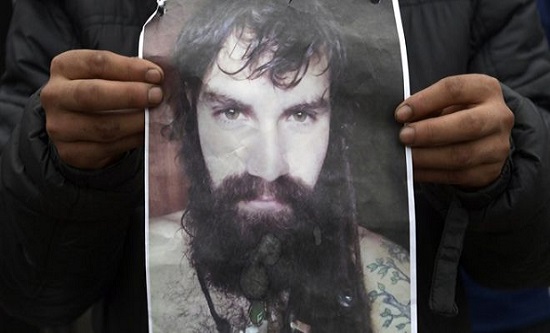
On 1 August 2017, a group of Argentina’s armed National Gendarmerie (GNA) attacked the territory of the Mapuche community Pu Lof en Resistencia, in the department of Cushamen, in Chubut province, Patagonia, Argentina. They attacked a roadblock which had been erected by protesters on the main north south route 40. They fired lead and rubber bullets and burned many families’ possessions. Santiago Maldonado, a 28-year-old activist who arrived the day before to support the community in its fight to reclaim traditional homelands, disappeared, was last seen caught and beaten as he retreated from the raid. He has not been seen for two months now. This Cushamen protest was held to defy the detention in March 2016 of Mapuche leader Facundo Jones Huala, who heads the Ancestral Mapuche Resistance (RAM) separatist group, and seven of his comrades. Jones Huala is in a Chubut jail, and the Chilean government, which considers him a ‘terrorist’, has requested his extradition.
Neoliberal president Mauricio Macri, despite various habeas corpus submissions, has tried to downplay this seizure, with ‘Security’ Minister Patricia Bullrich lying about Santiago’s family, labelling sections of the Mapuche People as ‘terrorists’ (so retrospectively justifying the use of the GNA who are not the regular police) and discrediting campaigners searching for Santiago.
The GNA is a security force ‘of a military nature’ which reports to the federal government. Since March 2015 the Mapuche community, under the constant surveillance of the police, has pursued a land claim against the ‘Compañía de Tierras del Sur Argentino’, owned by the Benetton family since 1991, which holds 900,000 hectares in Argentine Patagonia. The Maruche want 500 hectares returned to them, from which they were evicted by Benetton in 2002 as ‘illegal settlers’. Having seized the land from natives the Argentine government sold it into private hands in 1885 and 1896.
Oil and mining companies and large ranches have moved onto community lands – often by force – dispossessing Mapuche communities. In 2016, there was increasing stigmatisation and persecution of the Mapuche people, labelled as ‘threats to social security’, despite Argentina’s nominal adoption of international treaties establishing their rights in principle (UN Declaration on the Rights of Indigenous Peoples. ILO Convention No 169, and the Argentine Constitution article 75:17). This year Amnesty International issued an ‘Urgent Action’ for acts of repression and violence against the Mapuche community of Lof Cushamen in Chubut, carried out on 10 and 11 January. 200 armed police arrived with 9mm pistols, sighted rifles, batons, shields, a water cannon, and hydro plane, a helicopter, and several drones. In both episodes, the community suffered beatings and harassment of the women and children.
The grim reputation of disappearances and mass murder perpetrated in the Argentine ruling class’s recent history pushed thousands of protesters to march in Buenos Aires to demand the release of Santiago, only to be met with further repression by the police who used rubber bullets. In La Plata a second demonstration saw a Molotov cocktail thrown; evidence suggests agent provocateurs were used to discredit the otherwise peaceful protests. Global protests are also growing, forcing the government to offer a ‘reward’ for information, so hypocritically distancing itself from its agents’ actions. Now Santiago’s family say they have agreed to give samples of blood and saliva to check with the DNA of blood and hair found, ominously, in a police van.
We demand that the truth of Santiago’s disappearance be revealed and a definitive solution be found to the territorial claim of the people of Pu Lof, in the interests of the Mapuche.
Alvaro Michaels




